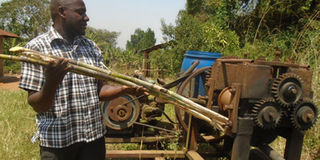Value addition earns Kakindi sweet money

Charles Kakindi feeds sugarcanes in a jaggery processing machine. Top right, he shows some of the processed jaggery before packaging. PHOTOs Fred Muzaale
What you need to know:
- Processing jaggery, is one way farmers can make more money from their canes which they buy cheaply at farm gate, writes Fred Muzaale.
- Comparably, Kakindi says from the 12 tonnes of cane, he gets 22 bags of jaggery sugar with each bag weighing 50kilogramme. He sells each bag between Shs150,000 and Shs160,000, depending on the forces of demand and supply.
Under the scorching sun, on a Wednesday afternoon, Charles Kakindi sweats profusely as he feeds the jaggery machine with sugarcane.
Kakindi is a manufacturer of jaggery used in the making of alcohol locally known as enguli. He owns 50 acres of cane.
A resident of Najja village in Kimenyedde Sub-county, Mukono District, the 29-year old is a sugarcane farmer but does not sell his cane to sugar manufacturing companies, although previously he used to.
“In 2002, I was growing sugarcane and selling it to Scoul but I realised I was being cheated because they were paying me Shs27,000 per tonne,” Kakindi says, adding, “Scoul and Mehta paid me and other cane farmers little money because there were no competitors at the time.”
At the time, sugar making companies such GM Sugar Uganda Ltd, Kamuli Sugar Ltd and Mayuge Sugar Ltd had not joined the industry.
“Besides the low prices, the weighing of the cane at the factory was not transparent,” he adds.
From a truck of 12 tonnes, in 2002, Kakindi used to earn about Shs324,000 or less.
Machinery
However, in 2003 Kakindi visited a friend in Iganga District, who was a cane farmer but was making black sugar from his produce.
By doing so, he was earning quite more than those who were selling their cane to sugar-making companies.
“I took up the initiative and bought a jaggery machine at Shs15m and three boilers at Shs3m,” Kakindi says.
Process
Extraction of juice
• Generally three roller mills are used for juice extraction. It’s driven by electrical motor or diesel engine.
• This extraction of juice is in the range of 60 to 70 per cent. After extraction of juice, suspended matters are removed by cotton cloth or fine mesh screen.
Clarification of juice
• The sugarcane juice contains colloidal matter, inorganic salts, fibre, various nitrogenous substances, lipids, gums, wax organic acid and inorganic acid. All these impurities are removed totally or partially in this clarification process.
• In the process, organic and inorganic clarificants are used.
• In organic, clarificants are from vegetable such as sweet potatoes, sweet onions, wheat, carrots and red cabbage.
Did you know
Sugar and jaggery are two common sweeteners used throughout the world. Although both are obtained from the same sources, they are different in properties and benefits.
Function
Although jaggery is not as widely used as sugar, it is still very popular in Indian culinary practices. It is used in curries, lentil soup, and other preparations. It is an integral part of the country’s sweets made by combining ground nuts, grams, sesame seeds, rice flakes, puffed rice, popped rice, cashew nuts, wheat, and gram flour snacks .
The money
Currently, sugar companies buy one tonne of sugar cane at Shs145,000 thus from a truck of 12 tonnes a farmer would earn about Shs1.4m.
However, from that amount he (the farmer) has to deduct Shs300,000 for transport, Shs100,000 for payment for cane loading services and Shs120,000 as payment for cutting the cane.
Thus, a farmer remains with net pay of about Shs1.2m.
Comparably, Kakindi says from the 12 tonnes of cane, he gets 22 bags of jaggery sugar with each bag weighing 50kilogramme. He sells each bag between Shs150,000 and Shs160,000, depending on the forces of demand and supply.
So from the 12 tonnes he earns about Shs3.5m. He says it costs him about Shs500,000 to mill the 12 bags of unrefined sugar.
He does not incur transport costs as he mills the cane from the plantation.
So he earns a net pay of Shs3m, beating the one who sells cane to the sugar company by at Shs1.8m.
“The farmer, who does not add value to their cane has to sell two trucks of 12 tonnes of cane to earn what I earn from the same tonnage,” he boasts.
He employs 10 workers who help him with the work.
And because he cannot have mature cane from his plantation all the time, he buys from other farmers in the area.
Market
Kakindi’s customers include livestock farmers who buy the sugar and feed it to their animals.
Also, he sells to people who make alcohol.
He has a store, where his customers buy his merchandise. In a week he sells between 20-35 bags of black sugar.




